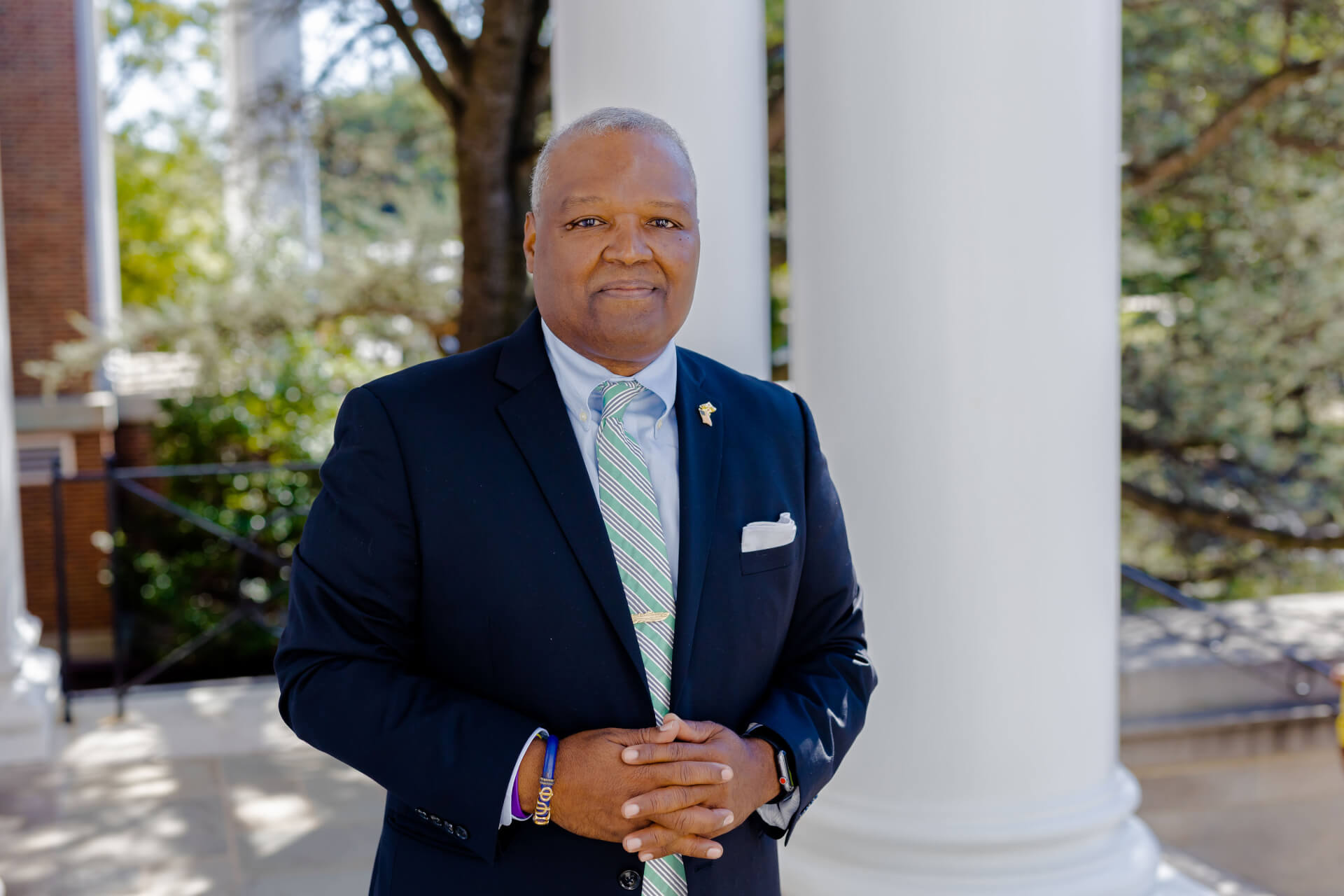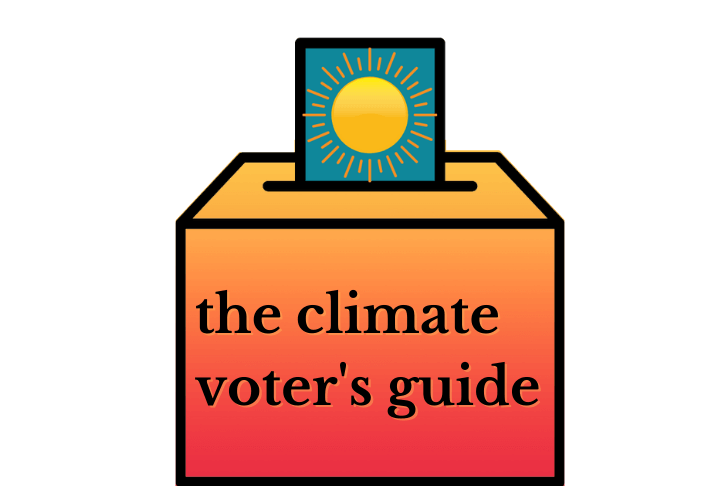On Climate, Baker Thinks Globally, Wants to Act Really Locally

Sixth in a series.
It isn’t every day that a conversation about climate change turns into a discussion about Marion Barry, the consequential but controversial former mayor of Washington, D.C.
But that’s just what Rushern L. Baker III, the former Prince George’s County executive and Democratic candidate for governor, did during a recent interview. Baker was talking about how Barry had the foresight to move several D.C. government offices to U Street Northwest, just a couple of blocks from a Metro station, just as the Green Line was opening. It meant city residents could access services and public workers could get to their jobs by public transit — and kept a certain number of cars off the road.
Baker is a veteran of local government: He worked for D.C. early in his career and he spent eight years as the top official in Prince George’s, Maryland second largest jurisdiction.
Most candidates for governor articulate their visions for confronting climate change from a 30,000-foot viewpoint. But Baker, steeped in the challenges that local governments routinely face, turns the conversation inside out. He talked to a great extent about using state government as a conduit and partner to help counties and municipalities address the risks posed by climate change.
“This is really where the rubber hits the road,” Baker said.
While other candidates for governor have criticized Gov. Lawrence J. Hogan Jr. (R) on different aspects of his climate record, Baker’s toughest criticisms touch on the lack of communication and collaboration between state government and local jurisdictions.
“You can pick good people. I don’t think anyone would doubt the qualifications of his secretary of the Environment [Ben Grumbles],” Baker said. “But I don’t think they’ve really engaged with local governments.”
By tapping veteran Montgomery County Councilmember Nancy Navarro (D) to be his running mate, Baker is doubling down on the notion that candidates with local government experience, who are closest to the needs and desires of their constituents, can be a potent force in a statewide election.
Baker takes pride in establishing a Department of the Environment within Prince George’s County government when he served as county executive. He recalls that the idea faced resistance from fellow politicians and the community at large.
The new agency had multiple missions, including stormwater management, recycling, getting part of the county vehicle fleet off fossil fuels, and more. Baker recalled that his decision to reduce the number of trash pickups in the county from twice a week to once a week, in part so the environment department could establish a functioning recycling program, was the most unpopular thing he did during his eight years as executive.
Baker said he understood the reluctance to embrace environmental priorities in a majority-Black community where public safety, education, and daily survival are paramount.
“African-American communities, even affluent African-American communities, and communities of color are not the first communities you think of when you think of [combating climate change],” he said. “So much else is going on.”
But this doesn’t mean that Black communities aren’t sympathetic to the cause and don’t want to be helpful, he observed.
Baker recalls local church leaders being skeptical of his administration’s stormwater management policies and the way the county aggressively moved to enforce them. But, he says, ministers eventually came to appreciate the measures because in the long run, they saved the churches money. Similarly, Baker said a farmer who initially opposed some of his environmental rules was eventually won over, and drove his tractor to Baker’s street in Cheverly to thank him.
“That was a little scary,” he said with a laugh. But there was also a lesson to be learned: When government sends a clear message that it wants to partner with individuals and institutions to achieve mutually beneficial goals, and not treat them as fringe groups, it will get the necessary buy-in to make significant progress.
“It’s important to let people know we get it, that we understand their concerns,” Baker said.
Green energy and the state economy
Representing a community that has often felt left behind in the progress and political leadership of the state — Baker served as county executive from 2010 to 2018 and in the House of Delegates from 1995 to 2003 — Baker is inclined to view the climate issue, and the importance of expanding green energy production, as a way to jumpstart the state’s economy and bring more economic opportunities to communities that have been left behind.
Baker also notes that so many issues that the next governor will be tackling — from education to transportation to agriculture to encouraging consumers to buy local goods and services to the extent possible — all touch to one degree or another on economic opportunity and climate change.
As county executive, Baker, like Marion Barry, looked to move certain vital government offices and services away from Upper Marlboro, the county seat, which has no Metro station nearby, to more centrally located hubs with better transit access.
He also dedicated county resources to the Purple Line at Hogan’s insistence, because he saw the value in the transit project’s completion to the local economy and the fight against global warming. During the administration of Martin J. O’Malley (D), Baker and then-Montgomery County Executive Isiah Leggett (D) were major cheerleaders for the governor’s push to raise the gasoline tax, knowing that the proceeds would be used to boost transit in the state.
With a major influx of federal transportation funding on its way, Baker believes that state and local government can be tapped to make one-time contributions to transit projects in the near future. While Baker supports many of the proposed transit projects that his Democratic rivals do, he is emphatic that the proposed transit line from the Largo Town Center in Prince George’s County to Southern Maryland can be launched and completed fairly quickly, with the appropriate amount of government subsidy.
This project is particularly imperative, he argued, “because Charles County has become part of the Washington, D.C., region. That’s on top of my priority list.”
Baker has many doubts about the Hogan administration’s plans to widen sections of the Capital Beltway and Interstate 270. And he said he isn’t sure how far along the project will be by the time the next governor takes office in January 2023.
But he posits that the project won’t be too far along by then and pledges to do a “cost-benefit analysis” into the roadwork’s progress to assess whether Hogan’s plan is worth maintaining at all. He likens it to a controversial assessment he undertook early in his administration on whether to keep his predecessor’s plans for updating county technology systems.
As he contemplates organizing his administration, Baker says he’d be in favor of creating some sort of “climate czar” position. But in keeping with his worldview, Baker envisions the person who gets the job working as much as a point person for outreach to local communities and the federal government as a coordinator of the state bureaucracy and state policies.
Baker said he would also like the climate czar to assess whether the state should continue to rely on nuclear energy and natural gas as part of its renewable energy portfolio. He said he’d ask this official, “What’s the real timeline for phasing these technologies out?”
Baker’s personal climate hero is…
Asked to name his personal climate hero — a question Maryland Matters posed to all the Democratic contenders for governor — Baker mentioned two. Both are men with whom he’s worked closely over the years (one other candidate, former state Attorney General Douglas F. Gansler, named two climate heroes as well).
One of Baker’s climate heroes is Adam Ortiz, the man he tapped to lead his fledgling Department of the Environment.
Ortiz, who just recently became the regional administrator for the U.S. Environmental Protection Agency, was adept at his official duties, Baker said. But just as important, he instilled key communities in the county with a sense of enthusiasm about their own responsibilities for protecting the planet.
“At first I wondered, ‘What do we care about these tree-huggers?'” Baker recalled. “Adam told me why — and how.”
Baker’s other climate hero is state Sen. Paul G. Pinsky (D-Prince George’s), the chair of the Education, Health and Environmental Affairs Committee and arguably the leading environmentalist in the General Assembly.
Baker recalls meeting Pinsky in 1994, as he was preparing to make his first bid for the House of Delegates. Pinsky had already served eight years in the House and was gearing up to run for state Senate in the same district. The men and their families became close friends, and Baker remembers intense conversations with Pinsky about the dangers of climate change and the necessity for government to move boldly and quickly to address them.
Baker said their conversations could become especially heated when he was serving as county executive and Pinsky was prodding him to do more. But Baker called Pinsky a visionary leader whose words should have been heeded 30 years ago and still need to be heeded today.
“He never wavered. He never stopped,” Baker said. “Imagine where we’d be today if we had done some of that stuff all those years ago.”
Coming Friday: An interview with Michael Rosenbaum. Click here for other stories in the Climate Voter’s Guide series.





 Creative Commons Attribution
Creative Commons Attribution